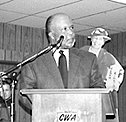In 1948, America stepped out of a world war with an economy still glowing from the explosive heat and an emerging middle class that promised great things for the world. Fueled by the optimism, President Dwight D. Eisenhower proclaimed Dec. 10 Human Rights Day, in honor of the adoption of the Universal Declaration of Human Rights on Dec. 10, 1948, by the United Nations General Assembly.
Almost 60 years later, socially minded people still hold rallies glorifying that proclamation. Workers' unions, in particular, have adopted the day as a celebration of their own battle for equitable pay and safety for workers.
The Mississippi AFL-CIO, the Mississippi Alliance of State Employees, Communications Workers of America and numerous other unions marked Dec. 10 by joining with concerned workers, including employees of the city of Jackson and the Nissan plant in Canton, and national union speakers to tout the importance of unionizing Mississippi. They gathered at the CWA Local 3511 at 1415 Country Club Drive. Union organizers had announced earlier in the week that Jackson Mayor Frank Melton—who is drawing attention for firing city employees and eliminating positions—would attend the rally, but Melton did not show.
Brenda Scott, president of the Mississippi Alliance of State Employees, said human rights and worker's rights were inseparably linked.
"If you have happy, organized workers the situation is going to be much better, and that's the first step toward having human rights," Scott said.
Union representatives also howled warnings about the damage done to unions in recent decades and the erosion of workers' rights that have followed.
Edward McElroy, president of the American Federation of Teachers, AFL-CIO, outlined the degradation through examples like the wearing away of pensions at major auto manufacturers, like General Moters spin-off Delphi, which is trying to push its pension deficit on to ailing federal insurance programs.
"Today the big automakers and airlines are running into bankruptcy court. They're saying 'remove that obligation from us to take that pension that we promised the workers.' If you took all of that money and instead of putting it into benefits and pensions you put it all into salaries and you saved one percent, do they have the right to say to you 'go to the bank and get the money and give us back the money from the last 30 years?' No, they wouldn't. That would be stealing, but that's what they're doing. They're stealing pensions from our brothers and sisters who worked all their lives," McElroy shouted. "How do you stop it? You organize. You go to your elected officials and you say 'stand up for us!'"
Unions traditionally fare poorly under the leadership of Republicans, but lately Democrats have not always been the champion of unionization, either.
The North American Free Trade Agreement drove a wedge between unions and Democrats in 1993 during the Clinton administration, with the subsequent deterioration of the American industrial economy. Rahm Emmanuel, a Clinton political operative who was made a deputy in the NAFTA Task Force, was instrumental in NAFTA's passage. He now heads the Democratic National Campaign Committee, and critics say he is arranging financial backing of a centrist candidate for the Illinois district of retiring Rep. Henry Hyde, despite the promising support numbers of a more progressive candidate running in that same district.
Even on the local level, Mississippi Democrats do not universally support the best interest of unions. Rep. Harvey Moss, D-Corinth, is head of the Mississippi House Labor Committee, for instance, and rarely holds committee meetings—essentially aborting any potential labor friendly bills before they're even born at the state level.
Moss' argument during the last session was that the Senate Labor Committee, chaired by Republican Terry Brown of Columbus, never meets, either.
One official in attendance Saturday was U.S. Rep. Bennie Thompson, a champion for unions, according to Mississippi AFL-CIO President Robert Schaffer. Thompson seized on the theme of supporting candidates who overwhelmingly supported workers' rights, and challenged voters to "check the record" of every candidate.
"It's tough for unions to get their act together in Mississippi because we're the 'right to work' state. We have (Gov.) Haley Barbour, we got (U.S. Sen.) Trent Lott, we got (U.S. Rep.) Chip Pickering and all the rest of that bunch that don't like anybody in this room," Thompson said.
"Check their voting record, because it'll speak for itself. Chip Pickering's voting record for organized labor is eight. I didn't say 80. I said eight, and he's trying to figure out how he got that eight, because he says that it's not right for you to have a safe working place for you to work in. According to his voting record, he says that health care ought to be a privilege rather than a right. He says that education for children ought to be something the parents take care of rather than the government to educate everybody, and then he says that businesses ought to decide who represents your local in a union."
Pickering's spokesman, Brian Perry said later, "Big labor is free to oppose Mr. Pickering's freedom-to-work votes, but Mr. Pickering will continue to support pro-worker and pro-growth legislation."
Despite political opposition, the union presence in Mississippi is showing progress in some areas, possibly in response to stagnant wages and job loss in the face of rising living expenses and gas prices. Scott announced at Saturday's event that the workers of the city of Jackson may have gathered enough signatures—supposedly 51 percent of the city's work force—to organize their own union. Scott said she would soon speak with Jackson Mayor Frank Melton regarding the union.



Comments
Use the comment form below to begin a discussion about this content.